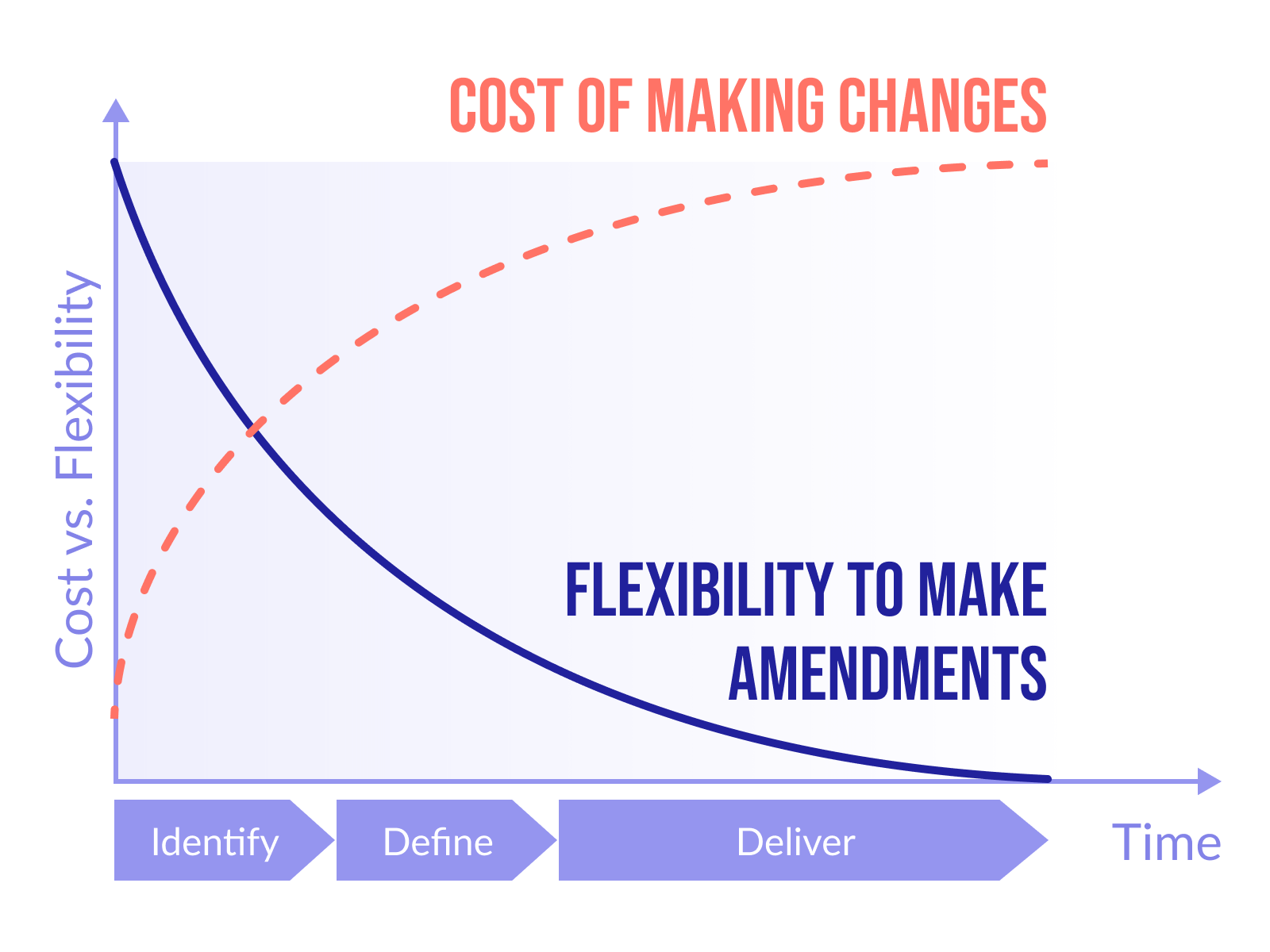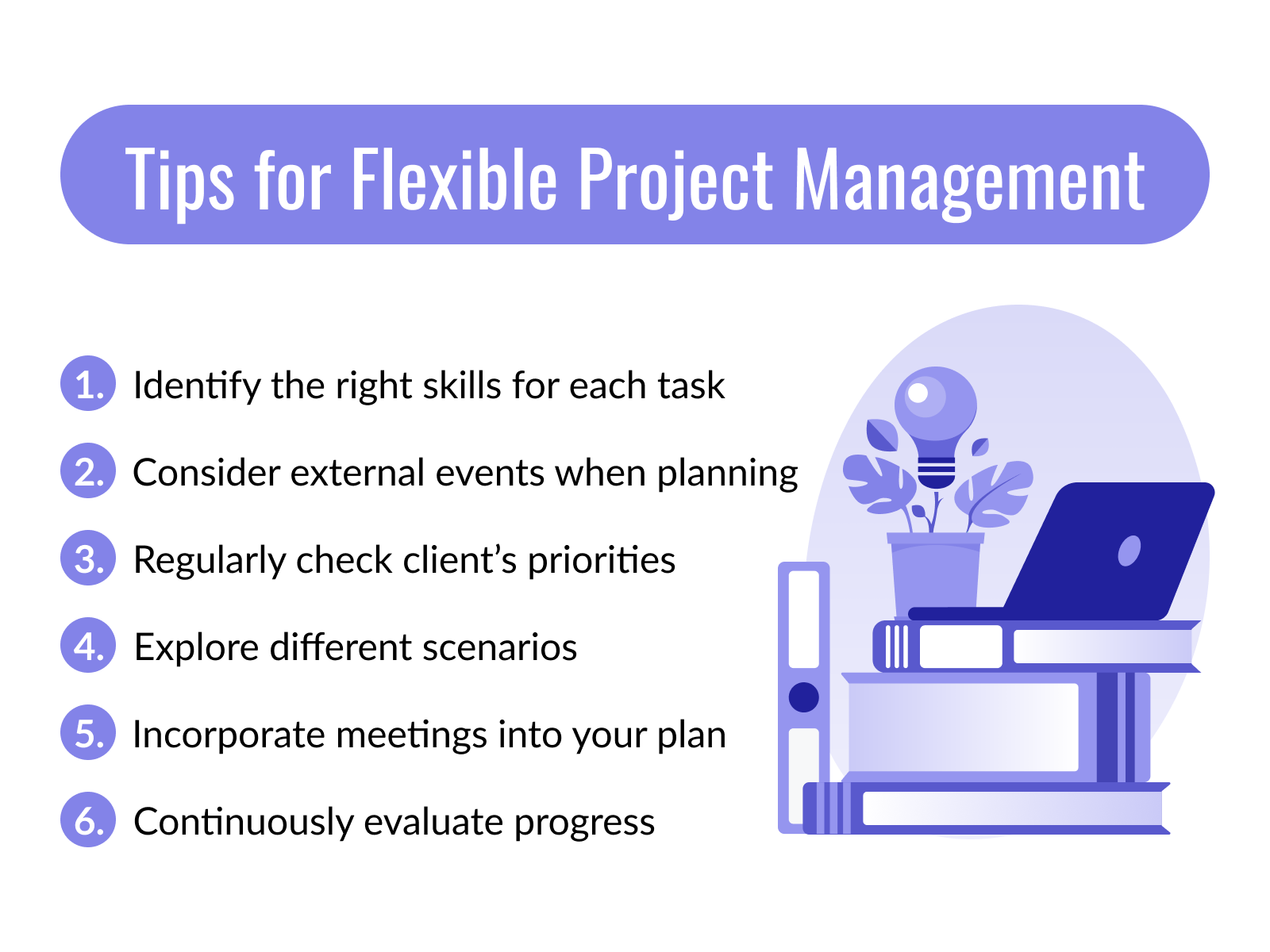In today’s business world, project management flexibility is vital to success. If a team or organization lacks flexibility in project management, it will struggle to overcome obstacles such as delays and budget constraints. In contrast, those who implement flexible project management can quickly adapt to unexpectedly large challenges, maximizing their chances of excelling.
This article will help you achieve your project goals by showing the importance of balancing price and flexibility. It will also offer tips applicable to many project management processes, such as communication, resource management, and detailed planning.
In This Article:
Understanding the Relationship Between Project Price and Flexibility
Flexibility in project management refers to how easy it is to make changes throughout the project's life, while project price is all about how much it'll cost to finish.
Usually, the more flexible a project is, the more expensive it'll be and vice versa.
- If the project isn't flexible enough, it can lead to delays, extra costs, and lots of frustration for everyone involved.
- On the other hand, if it's too flexible, it can be a headache to manage and end up costing you more time and money than you need.
So, what’s the secret to finding the right balance between cost and flexibility to make the project run smoothly? A skilled project manager can do just that and make sure the entire project is finished on time and within budget, while still allowing for some changes along the way.

What Are the Benefits of Flexible Planning
While balanced flexibility can be difficult to achieve on a project, it can also be very rewarding, as you will see below:
- Adaptability to circumstances: With a flexible plan, experienced project managers can easily adjust timelines, finite resources, and scope to fit whatever's going on. This allows them to handle unexpected changes without much difficulty.
- Reduced costs: By planning for unexpected problems and taking necessary precautions, you can avoid additional expenses resulting from delays or mistakes. As a result, the project budget can be managed more efficiently.
- Better risk management: A flexible plan makes it easier to identify potential risks and prepare backup plans. This keeps you and your team ready to face anything that comes your way.
- Improved teamwork: Flexible planning encourages frequent communication among the project group, especially for remote teams. This not only enhances project performance but also ensures all team members agree on things like the project schedule and strategic objectives.
- Faster decision-making: The ability to adapt quickly leads to making decisions faster, even under pressure. This can be crucial when the team is running multiple projects.
- As you can see, flexible planning can be very useful. However, putting it into practice can be tough. That is why you must do it wisely, as we will show you below.
Tips for Flexible Project Management
Now that we are more aware of the connection between project price and flexibility, as well as the benefits of flexible planning, let's look at some useful advice for managing projects flexibly.
Identify the Right Skills for Each Task
Making sure you have the right people with the right skills for each task is one of the key project management skills. This is particularly true in Agile projects where you need to break down tasks into smaller ones to keep up with the rapid pace of change.
Anyway, this whole thing can be tricky sometimes, especially when you're working with team members who might not have the skills or experience needed and even more so when working on simultaneous projects.
To make sure the team has the necessary skills, you can interview them, review their performance on past projects, and observe where they shine and where they struggle.

Uncover more
Agile Psychological Safety: Building Psychological Safety In Agile Teams
Learn how to create an atmosphere where individuals feel secure to express their ideas, take risks, and ultimately drive the success of Agile projects.
Read the whole articleAny skills shortage you notice could be fixed by training team members or hiring new staff. This advice can have such a positive effect that it may even help to build a more qualified team for future projects.
But don't forget about those outside factors that could mess up your project — as you’ll see next.
Consider External Events When Planning
By external events, we mean everything that is beyond your control, such as changes in the market, shifts in people’s desires, unavailability of team members, natural disasters, and other circumstances threatening the project’s progress.
With Flexible Project Management, the project can go ahead even if those things happen. To do so, keep in mind the following tips:
- See if any events could throw off your project timeline—things like national holidays or when your team's taking some much-needed time off.
- After that, figure out which folks won't be around during those days so that you won’t be scrambling to cover any gaps.
- Later, think ahead and see if those events could impact anything down the line. If so, adjust the project timeline to avoid any headaches that those hiccups could cause.
- Finally, do not forget that sometimes the team might need to put in a little extra work to make up for the lost time. That means you should budget for overtime (if necessary) and make sure it's accounted for in the project plan.


Thank you for Subscription!
Regularly Check Client's Priorities
Flexible projects often require working closely with clients to fully understand what they want. However, since priorities can change over time, it's essential to verify and re-verify clients’ goals during the project.
This means keeping up regular communication, sharing progress and updates frequently, and making sure everyone is aware of any changes.
A great project manager will ensure the project delivers real outputs that satisfy the client's aspirations. If changes need to be made to the project plan to achieve this, they won't hesitate to make those adjustments.
By showing dedication to delivering value, this tip also helps build a strong customer relationship.
Explore Different Scenarios
Effective planning in project management should consider various scenarios and outcomes rather than adhering to one rigid plan. By doing so, you can anticipate potential roadblocks and develop a solid risk management plan.
Don't worry about making overly complicated plans. Instead, start with more general plans and adjust them later.
Furthermore, it is essential to involve your team in this process. Taking advantage of everyone's unique knowledge and experience can help generate even more original ideas and strategies.
Say a software development project requires specific devices that might not always be available. In reaction to such an eventuality, the manager must have a backup strategy that uses a different technology.

Explore some insights
Business Process Management (BPM): Life Cycle, Trends And Benefits
Whether you're a business leader, manager, or enthusiast, this article offers valuable insights into the transformative power of BPM in today's business landscape
Read moreIncorporate Meetings into Your Plan
Organizing periodic interactions with the client and the team is an excellent strategy to promote effective communication. By doing so, everyone involved in the project can stay informed and engaged, and any differences or concerns can be resolved as soon as possible.
- For team meetings: Consider periodic meetings for your team to go over project progress, upcoming tasks, and any common challenges that need to be sorted out.
- For client meetings: Schedule regular check-ins to provide updates and address any changes in priorities. Also, you can gather feedback from the client and discuss any aspect of the project, such as milestones, cost buffers, and cash flow projections.
Suppose a project starts in NL, where the client and the team may operate in different time zones. In such cases, establishing clear communication channels and protocols is necessary to prevent misunderstandings and ensure everyone is kept up-to-date.
To achieve that, it may be necessary to organize regular virtual meetings or make use of collaboration tools such as Slack or Asana.
Continuously Evaluate Progress
Constant monitoring of progress is mandatory in most projects due to the rapidly changing environment in which they occur. You need to constantly be tracking a wide range of metrics, including Key Performance Indicators (KPIs), timelines, and resource utilization.
Nevertheless, collecting data alone is not enough. You must also analyze and interpret that data. To do that, many project managers make use of tools such as status reports, Earned Value Analysis (EVA), and Critical Path Analysis (CPA).
By meticulously reviewing your results, you'll be able to determine where you're succeeding and where you're failing.
This also includes identifying high-performing team members, recognizing milestones that have been achieved, and taking note of the best practices that can be shared across the organization.

Conclusion
Even though it might not be possible to anticipate every situation that might occur during a project, it is certainly feasible to be set for the unexpected by using flexible planning. This form of management not only helps to overcome any adversity but also promotes a culture of resilience in organizations.
Geniusee understands the importance of being flexible in project management. That's why they offer outsourcing services to help you and your team stay on track. To learn more about how their services can benefit your projects, contact us today.





















